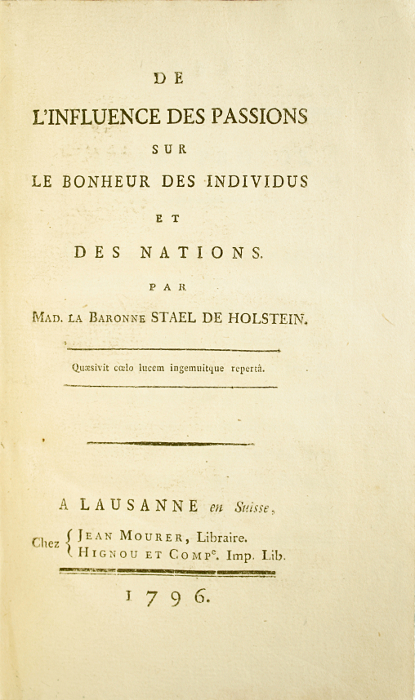STAËL, Madame de. De l’influence des passions sur le bonheur des individus et des nations. Lausanne, Jean Mourer et Hignou, 1796.
8vo [196 x 120 mm] of 376 pp. Bound at the time of publication without the errata l., the corrections mentioned on this leaf having been corrected in black ink by the editor. Handwritten corrections in the text. Preserved in the original publisher’s pink boards, flat spine bearing a label with the handwritten title, mottled edges. Slight traces of wear. Contemporary bound.
First edition of Madame de Staël’s first great work that would establish her literary reputation. Escoffier, Le Mouvement romantique, 80; Schazmann, 22; Longchamp, 29.
“Here is one of the great books of what we called the literature of the 3rd year of the French Republican Calendar. Despite the title, the author didn’t deal with the announced part about the ‘happiness of Nations’. But the one which concerns ‘happiness of individuals’ is above all Mme de Staël ‘s sincere confession. She tried to abstain and to write a ‘Treatise on the Passions’, but we shall remember her confession: ‘it pained me to pronounce that love with passion was not real happiness’. In any case, before her literary manifesto (‘De la Littérature’) in which people saw the announcement of new times, we find in ‘On the Influence of Passions’ the analysis of what is going to become the romantic ‘state of mind. ‘Love when it is a passion always leads to melancholy… The one who wants to include suicide as part of his resolutions can enter in the career of passions… There is a deep conviction inside yourself that everything following love is nothingness…; and this conviction makes thinking to death in the happiest moments of love’. We feel, as it was very well said, ‘that Chateaubriand is going to appear and that Lamartine is born’. This treatise is the combination, on the theoretical level, of ‘Werther’ with the New Heloise’.” (Escoffier)
Mme de Staël was barely thirty when she published this important work, the first that was going to establish her literary reputation. Here she puts forward the loving feeling under its emotional form, its association with death, especially with voluntary death… The work was supposed to be in two parts; the present one, about the happiness of individuals, and a second one about the happiness of Nations, which was never composed.
“The work was hardly published when Mme de Staël decided to make essential modifications of elocution, for which the editor made six cancels, so its edition is represented in two different states.” The present work is composite since it shows both remarks from the first state and also 6 out of the 9 cancels (pp. 27, 47, 61, 62, 91 and 92) that the author, when the book was hardly edited, decided to insert in order to improve the style of some passages. Besides, our copy has the particularity of having been bound without the errata leaf added at the end, but with all the mistakes mentioned in this l. meticulously contemporary hand corrected.
A very pure copy preserved in the original publisher’s pink boards.



